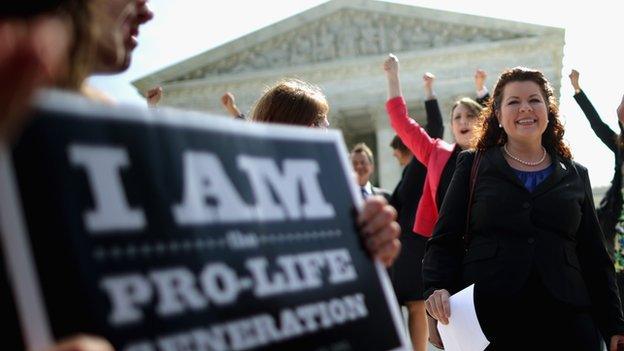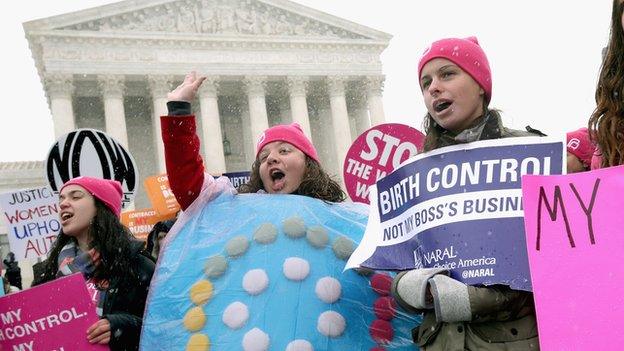Hobby Lobby: Court boosts corporations again
- Published
- comments

Conservatives loved it but thought it could have been better, while liberals hated it but admitted it could have been worse.
Such was the gist of the reaction to the US Supreme Court's 5-to-4 decision to grant companies owned by families or small groups an exemption to the federal requirement that they provide insurance with free contraceptive care to their employees.
"Americans don't surrender their freedom by opening a family business," Alliance Defending Freedom's David Cortman said, external. "In its decision today, the Supreme Court affirmed that all Americans, including family business owners, must be free to live and work consistently with their beliefs without fear of punishment by the government."
Meanwhile, Debra L Ness of National Partnership for Women & Families took the opposite view, external:
Today's US Supreme Court rulings in the Hobby Lobby and Conestoga Wood Specialties Corp. cases are deeply troubling - even shocking, in that the Court is allowing some bosses to deny women coverage for something as basic as birth control.
Several commentators have latched on to a key portion of the decision - construing corporations as "people" under the definition of the Religious Freedom Restoration Act (RFRA). The law, passed in 1993, requires the government to have a "compelling interest" when enacting laws that "substantially burden" a person's free exercise of religion.
The court, in effect, ruled that corporations are indeed covered by the RFRA and - in regards to "closely held" corporations, at least - the contraception mandate was a substantial burden.
The Daily Beast's Sally Kohn says, external the court's decision reflects the latest in a series of cases in which a majority of the justices give "more and more power and privilege to already powerful and privileged corporations".
"At a time when we should be putting more checks and balances in place for corporate America, the Supreme Court is loosening the reins," she writes.
Bloomberg View's Noah Feldman notes, external that just because the court ruled that closely held corporations could have religious beliefs, that doesn't apply to all corporations.
"It was a much easier case to make that closely held corporations such as Hobby Lobby are in essence proxies for their owners - and the precedent from today stretches no further," he writes.
Of course, as the financial website Inc. writes, external, more than 90% of US businesses qualify as closely held. They also employ 52%, external of US workers.
Reason magazine's Peter Suderman, on the other hand, says, external the court's decision isn't about corporations, it's about the religious beliefs of people who found them.
"It's pretty clear that complying with the contraception requirement would have violated the religious beliefs of the individuals in the small family that owns Hobby Lobby," he writes.
Now the Obama administration will have to decide how - or whether - to provide contraceptive coverage to the employees whose companies choose to exercise the religious exemption. In his majority opinion, Justice Samuel Alito said that the government could have the insurance companies themselves cover the costs - a model similar to a government-constructed workaround offered for religious-affiliated nonprofits.
The New Republic's Danny Vinik says, external that while such a solution may be a way out for supporters of the contraception mandate, there are some problems with this option. Insurance companies could balk at the additional costs, and the owners of for-profit companies could voice similar objections as some of their non-profit counterparts.
"Insurers, they argue, will just increase premiums in order to cover the free contraception, meaning that the religious institutions will be effectively paying for contraceptive coverage anyways," he writes.
Then there is the political fallout from the decision.
Salon's Jim Newell says that while today's ruling may be a boost for conservatives, it could come back to haunt them in the midterm congressional elections in November.
"The battle over access to women's health care, with Rush Limbaugh calling Sandra Fluke a 'slut' being its avatar, has proven to have remarkable political resonance in turning out the vote against 'social conservatives'," he writes, external.
The Federalists' Ben Domenech writes, external that this ruling shows that the "culture wars" in the US are just getting started.
The Hobby Lobby decision, he says, did nothing to staunch the liberal drive to impose their views via government policies.
"We've moved from a point where corporations providing benefits to employees was considered a good thing to a point where corporations which provide some benefits but not all must be made to suffer," he writes.
- Published30 June 2014

- Published25 March 2014
